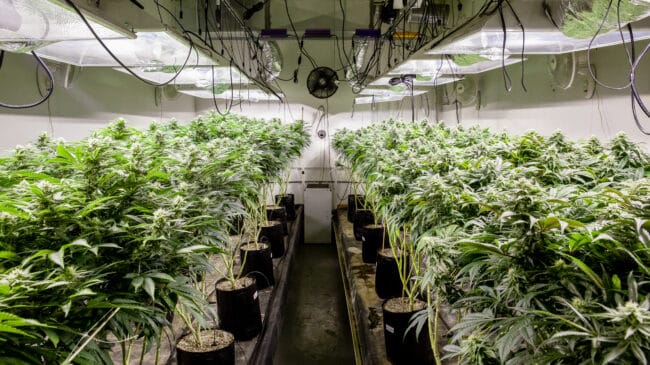On June 30, California Gov. Gavin Newsom signed Assembly Bill 195. The new law makes multiple reforms to California’s regulated cannabis market that were recommended by the Reason Foundation, including the repeal of the state’s wholesale tax on cannabis cultivation.
Gov. Gavin Newsom signed California’s 2022-23 state budget into law and, in doing so, enabled a significant shift in cannabis taxes that had long been sought by the industry.
The finalized budget eliminates the state marijuana cultivation tax and caps the 15% excise tax where it’s at for a minimum of three years.
Taxes have been one of the top complaints of licensed marijuana businesses in California, but until this year, attempts to roll back state tax rates had been met with defeat…
“More work needs to be done, but I see this as a big win,” Amy Jenkins, lobbyist for the California Cannabis Industry Association, told the Business Journal.
“To critics, I say this is a significant first step.”
The cannabis cultivation tax was a tax assessed on the dry weight of cannabis flowers at a rate of $161.28 per pound. While it was nominally assessed against licensed cannabis cultivators, the collection and remittance obligations were placed on the first licensed distributor to acquire the wholesale products from a cultivator. This made the accounting convoluted and, practically, cannabis cultivation tax liabilities were difficult to audit.
Moreover, as a wholesale tax, this levy raised the price of legal cannabis relative to illegal cannabis, but in a nontransparent manner because the cultivation tax was baked into the wholesale cost of goods without appearing as a taxable line item at retail to the ultimate consumer.
A Reason Foundation policy brief published in May examined the effect of California’s various taxes on legal cannabis commerce and how they affect individuals’ decisions to participate in the legal or illegal market. The research examined taxes assessed at the local and state levels, concluding that the effective taxes levied per pound of cannabis flower ranged from $677 per pound to $1,441 per pound in California, depending on the local jurisdiction.
The cumulative effect of these taxes creates a price disparity between otherwise comparable cannabis products available on the legal and illicit markets. Recent surveys indicate consumers prefer legal cannabis products—if they are available at comparable prices to competing products on the illicit market, but will prefer illegal products as those prices diverge.
Reason Foundation obtained price and sale data for legal cannabis transactions in California and determined that consumers will purchase about 0.77% fewer legal products for every 1% rise in their price, with many of those consumers likely substituting illicit goods in their purchase decisions.
Analysis of per-capita spending levels on legal cannabis products in California, Colorado, and Oregon found that residents in these peer states spend more than three times per capita on legal cannabis products than Californians and this disparity could not fully be explained by differences in usage rates. It was reasonable to conclude, based on these observations, that high cumulative tax rates on legal cannabis products in California have inspired consumers to purchase substitute black-market goods, which account for roughly two-thirds of all cannabis spending in the state.
Reason Foundation recommended, at minimum, a repeal of the cultivation tax and perhaps a reduction in the retail excise tax. Our models revealed how the market would grow under various tax regimes as more consumers were induced to patronize legal retailers due to a falling price disparity between legal and illicit goods. A repeal of the cultivation tax, for example, could be expected to more than double the existing monthly cannabis tax revenues within two years as more transactions become subject to retail excise and general sales taxes.
Assembly Bill 195 not only accomplishes this repeal of the cultivation tax but also shifts the remittance burden of retail excise taxes from distributors to the retailers who sell the products and can accurately account for the final sales price. This important change has also been recommended by Reason Foundation because the prior system was difficult both to comply with and administer.
Finally, the bill would provide state support to local governments that have struggled to issue licenses to cannabis retailers. As Reason Foundation’s research notes, California boasts only one legal retailer per 29,282 residents while Colorado and Oregon boast one per 13,838 and 6,145 residents, respectively. More than half of California’s legal retailers are located in just 18 municipalities.
Since California’s fiscal year began on July 1 and these changes had been incorporated into Gov. Newsom’s budget, it was vital that he sign this bill on the date he did.
However, important follow-up legislation remains alive in California. For example, Senate Bill 1281, which would lower the retail excise tax from 15% to 5%, would bring relief to California’s struggling legal cannabis market and has already passed the Senate by a vote of 29-1.
California has just made tremendous progress in trying to turn around its regulated cannabis market and more could soon be on the way.

